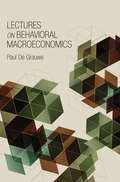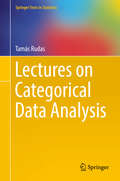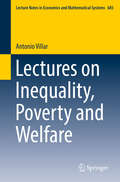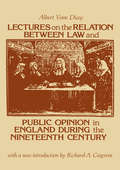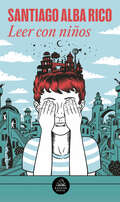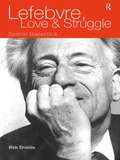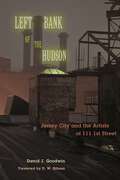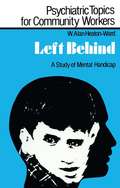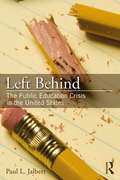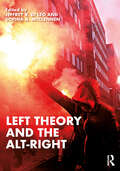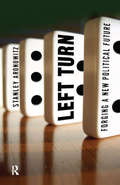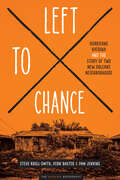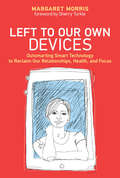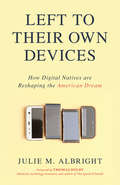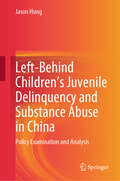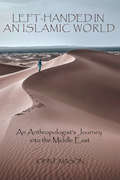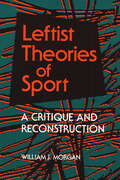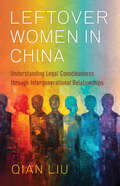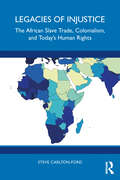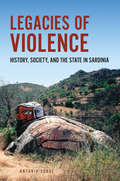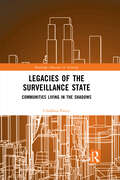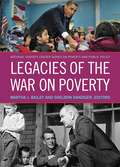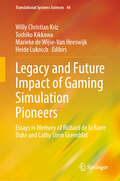- Table View
- List View
Lectures on Behavioral Macroeconomics
by Paul De GrauweIn mainstream economics, and particularly in New Keynesian macroeconomics, the booms and busts that characterize capitalism arise because of large external shocks. The combination of these shocks and the slow adjustments of wages and prices by rational agents leads to cyclical movements. In this book, Paul De Grauwe argues for a different macroeconomics model--one that works with an internal explanation of the business cycle and factors in agents' limited cognitive abilities. By creating a behavioral model that is not dependent on the prevailing concept of rationality, De Grauwe is better able to explain the fluctuations of economic activity that are an endemic feature of market economies. This new approach illustrates a richer macroeconomic dynamic that provides for a better understanding of fluctuations in output and inflation. De Grauwe shows that the behavioral model is driven by self-fulfilling waves of optimism and pessimism, or animal spirits. Booms and busts in economic activity are therefore natural outcomes of a behavioral model. The author uses this to analyze central issues in monetary policies, such as output stabilization, before extending his investigation into asset markets and more sophisticated forecasting rules. He also examines how well the theoretical predictions of the behavioral model perform when confronted with empirical data. Develops a behavioral macroeconomic model that assumes agents have limited cognitive abilities Shows how booms and busts are characteristic of market economies Explores the larger role of the central bank in the behavioral model Examines the destabilizing aspects of asset markets
Lectures on Categorical Data Analysis
by Tamás RudasThis book offers a relatively self-contained presentation of the fundamental results in categorical data analysis, which plays a central role among the statistical techniques applied in the social, political and behavioral sciences, as well as in marketing and medical and biological research. The methods applied are mainly aimed at understanding the structure of associations among variables and the effects of other variables on these interactions. A great advantage of studying categorical data analysis is that many concepts in statistics become transparent when discussed in a categorical data context, and, in many places, the book takes this opportunity to comment on general principles and methods in statistics, addressing not only the “how” but also the “why.” Assuming minimal background in calculus, linear algebra, probability theory and statistics, the book is designed to be used in upper-undergraduate and graduate-level courses in the field and in more general statistical methodology courses, as well as a self-study resource for researchers and professionals. The book covers such key issues as: higher order interactions among categorical variables; the use of the delta-method to correctly determine asymptotic standard errors for complex quantities reported in surveys; the fundamentals of the main theories of causal analysis based on observational data; the usefulness of the odds ratio as a measure of association; and a detailed discussion of log-linear models, including graphical models. The book contains over 200 problems, many of which may also be used as starting points for undergraduate research projects. The material can be used by students toward a variety of goals, depending on the degree of theory or application desired.
Lectures on Inequality, Poverty and Welfare
by Antonio VillarThese lectures aim to help readers understand the logics and nature of the main indicators of inequality and poverty, with special attention to their social welfare underpinnings. The key approach consists in linking inequality and poverty measurement with welfare evaluation. As concern for inequality and poverty stems from ethical considerations, the measurement of those aspects necessarily involves some value judgments. Those value judgments can be linked, directly or indirectly, to welfare assessments on the distribution of personal and social opportunities. Inequality and poverty are thus considered to be partial aspects of the welfare evaluation of the opportunities in a given society. The volume includes two applications that illustrate how the models can be implemented. They refer to inequality of opportunity and poverty in education, using PISA data.
Lectures on the Relation Between Law and Public Opinion in England During the Nineteenth Century (Social Science Classics)
by Albert Venn DiceyThe famed 1914 edition of this classic is one of the small handful of works that deserve to be read by Americans to understand the 1980s. Indeed, the final three chapters, describing the decline of will and consensus in late Victorian England, stand as a stark, unmistakable reminder that such national decline can happen again. Dicey was the most influential constitutional authority in late Victorian and Edwardian Britain. Modern politicians have often invoked the phrase "rule of law." So commonplace has it become that few recognize its source in the work of Dicey. Law and Public Opinion in England is written with simplicity, wit and a sense of purpose that marks it as a book apart. It did much more than fortell the decline of empire, it developed the forms in which such decline comes about. In many ways this book represents a pioneering statement on the libertarian tradition as a consequence of rather than rebellion against the legal norms of an advanced civilization. This is a central book for students of society and politics alike.
Leer con niños
by Santiago Alba RicoUn libro puede cambiar el mundo. Freud convenció a la tradición literaria occidental de que todos los niños quieren matar a sus padres cuando lo que en realidad nos cuenta la historia de Edipo -como varias decenas de mitos y relatos populares- es, al revés, que son los padres, o al menos los reyes, los que quieren matar, devorar o abandonar a sus hijos. Este libro, que cabalga entre el ensayo y la ficción, parte de una experiencia singular: la lectura compartida de la literatura sin etiquetas: Homero, Dickens, Canetti, Dante, Salinger... A partir de ahí plantea y responde a dos preguntas inseparables: «¿Para qué sirven los niños?» y «¿Para qué sirven los libros?». En una sociedad dominada por «solteros sin imaginación», en la que la infancia, exaltada en un escaparate, se ha vuelto más vulnerable que nunca y en la que la discontinuidad del niño y la continuidad del relato están radicalmente amenazadas, Santiago AlbaRico reivindica una especie de nuevo compromiso «materno» que una, como en la experiencia de Sherezade, los Cuentos y los Niños. De ello depende la educación, no de Edipo, sino de Layo; es decir, la educación de los asesinos. La crítica ha dicho...«Leer con niños va de niños y de libros, pero mucho más del niño que los adultos llevamos dentro, sin que falte el adulto que los niños llevan dentro.»El Mundo «Habla de la gente que defiende su tiempo para leer, de la vida en una época bárbara que pretende acabar con los relatos de carne y hueso, de las nuevas formas virtuales de dominación, de la pobreza, de las prisas crueles de un capitalismo que nos impone hábitos de solteros y de huérfanos.»Luís García Montero «Un libro cautivador y excitante, repleto de destellos: un libro valientemente interpelador en el que destacan las observaciones muy delicadas sobre los niños, fruto de una atención apasionada y amorosa.»IgnacioEchevarría, El Mercurio «Un libro delicado y brutal sobre para qué sirven los niños y, por lo tanto, para qué sirve la diferencia entre lo bueno y lo malo, lo horrible y lo maravilloso. Un libro necesario cuando esas diferencias parecen confusas a tantas personas.»Belén Gopegui «Tras muchos años de haber combatido la escuela y la familia como aparatos de reproducción ideológica, este libro vuelve a reivindicarlas desde la izquierda como espacios de resistencia.»Rebelión.org «Este ensayo sobre el papel de la literatura y la educación en la jungla salvaje del capitalismo contiene pistas impagables y preguntas inquietantes.»Javier Rodríguez Marcos, El País «Leer con niños [...] fluctúa entre el ensayo, la literatura, el periodismo y la autobiografía con una fluidez deslumbrante.»Darwin Palermo «Leer con niños es un tratado puro (y a veces duro) de ética y filosofía política, pero animado por un contagioso ritmo literario.»Alba Rico, Babelia, El País
Leer con niños
by Santiago Alba RicoUn libro puede cambiar el mundo. Freud convenció a la tradición literaria occidental de que todos los niños quieren matar a sus padres cuando lo que en realidad nos cuenta la historia de Edipo -como varias decenas de mitos y relatos populares- es, al revés, que son los padres, o al menos los reyes, los que quieren matar, devorar o abandonar a sus hijos. Este libro, que cabalga entre el ensayo y la ficción, parte de una experiencia singular: la lectura compartida de la literatura sin etiquetas: Homero, Dickens, Canetti, Dante, Salinger... A partir de ahí plantea y responde a dos preguntas inseparables: «¿Para qué sirven los niños?» y «¿Para qué sirven los libros?». En una sociedad dominada por «solteros sin imaginación», en la que la infancia, exaltada en un escaparate, se ha vuelto más vulnerable que nunca y en la que la discontinuidad del niño y la continuidad del relato están radicalmente amenazadas, Santiago Alba Rico reivindica una especie de nuevo compromiso «materno» que una, como en la experiencia de Sherezade, los Cuentos y los Niños. De ello depende la educación, no de Edipo, sino de Layo; es decir, la educación de los asesinos. La crítica ha dicho...«Leer con niños va de niños y de libros, pero mucho más del niño que los adultos llevamos dentro, sin que falte el adulto que los niños llevan dentro.»El Mundo«Habla de la gente que defiende su tiempo para leer, de la vida en una época bárbara que pretende acabar con los relatos de carne y hueso, de las nuevas formas virtuales de dominación, de la pobreza, de las prisas crueles de un capitalismo que nos impone hábitos de solteros y de huérfanos.»Luís García Montero «Un libro cautivador y excitante, repleto de destellos: un libro valientemente interpelador en el que destacan las observaciones muy delicadas sobre los niños, fruto de una atención apasionada y amorosa.»Ignacio Echevarría, El Mercurio «Un libro delicado y brutal sobre para qué sirven los niños y, por lo tanto, para qué sirve la diferencia entre lo bueno y lo malo, lo horrible y lo maravilloso. Un libro necesario cuando esas diferencias parecen confusas a tantas personas.»Belén Gopegui «Tras muchos años de haber combatido la escuela y la familia como aparatos de reproducción ideológica, este libro vuelve a reivindicarlas desde la izquierda como espacios de resistencia.»Rebelión.org «Este ensayo sobre el papel de la literatura y la educación en la jungla salvaje del capitalismo contiene pistas impagables y preguntas inquietantes.»Javier Rodríguez Marcos, El País«Leer con niños [...] fluctúa entre el ensayo, la literatura, el periodismo y la autobiografía con una fluidez deslumbrante.»Darwin Palermo «Leer con niños es un tratado puro (y a veces duro) de ética y filosofía política, pero animado por un contagioso ritmo literario.»Alba Rico, Babelia, El País
Lefebvre, Love and Struggle: Spatial Dialectics
by Rob ShieldsLefebvre, Love and Struggle provides the only comprehensive guide to Lefebvre's work. It is an accessible introduction to one of the most significant European thinkers of the twentieth century. Rob Shields draws on the full range of Lefebvres writings, including many previously untranslated and unpublished works and correspondence. Topics covered include Lefebvre's early relationship with Marxism, his critique of the rise of fascism, as well as his Critique of Everyday Life and the significant work on urban space for which he is best known today.
Left Bank of the Hudson: Jersey City and the Artists of 111 1st Street
by David J. GoodwinIn the late 1980s, a handful of artists priced out of Manhattan and desperately needing affordable studio space discovered 111 1st Street, a former P. Lorillard Tobacco Company warehouse. Over the next two decades, an eclectic collection of painters, sculptors, musicians, photographers, filmmakers, and writers dreamt and toiled within the building’s labyrinthine halls. The local arts scene flourished, igniting hope that Jersey City would emerge as the next grassroots center of the art world. However, a rising real estate market coupled with a provincial political establishment threatened the community at 111 1st Street. The artists found themselves entangled in a long, complicated, and vicious fight for their place in the building and for the physical survival of 111 1st Street itself, a site that held so much potential, so much promise for Jersey City.Left Bank of the Hudson offers a window into the demographic, political, and socio-economic changes experienced by Jersey City during the last thirty years. Documenting the narrative of 111 1st Street as an act of cultural preservation, author David J. Goodwin’s well-researched and significant contribution addresses the question of the role of artists in economically improving cities. As a Jersey City resident, Goodwin applies his knowledge of the city’s rich history of political malfeasance and corruption, including how auspicious plans for a waterfront arts enclave were repeatedly bungled by a provincial-minded city administration. In writing this story, Goodwin interviewed thirteen artists and residents, two businesses, three government officials, and five non-profits, civic organizations, and community activists. The book chronologically explores the history and business of the P. Lorillard Tobacco Company, its evolution into a bustling arts community, the battle to preserve the warehouse as a historic structure, and the lessons to be drawn from the loss and ultimate demolition of the building in 2007, as well as the present state of the neighborhood. Setting the facts straight for future generations, Left Bank of the Hudson provides an illustrative lesson to government officials, scholars, students, activists, and everyday citizens attempting to navigate the “rediscovery” of American cities.
Left Behind: A Study of Mental Handicap
by W. Alan Heaton-WardFirst Published in 1978. Routledge is an imprint of Taylor & Francis, an informa company.
Left Behind: The Public Education Crisis in the United States
by Paul L. JalbertThis book addresses the harmful influences that the cultural, social, economic, political and ideological dimensions, in current ‘American’ society, have upon the delivery of elementary, secondary and university education. It examines the effects of poverty, funding at the local, state and federal levels and racial and ethnic discrimination. Arguing against the continuation of standardized testing—an ill-conceived methodology to measure the performance of children—the author advocates more one-on-one teaching and evaluation. He charges that students’ rights to education are not respected and, in elementary and high school, receive little in the way of instruction that translates into life skills and proposes what some of those skills should be. A critique of the extreme ethnocentric approach to education in the United States, Left Behind advocates strong instruction in the Humanities and foreign languages and the establishment of education abroad as a permanent program in high school and university. The author identifies Capitalism as the basic influence that, in the form of employing ‘business model’ constructs, has slowly transformed our children into obedient consumers. Physical Education has waned and become a major contributor to adolescent obesity. Seeking to replace children’s complacency with critical thinking instruction, the author demonstrates how the corporate mass media occupy their minds. He also fears the erosion of the profession of teaching by an ‘online’ instruction frenzy. The book explores the possibilities for a viable nation-wide education institution, in which decision-making is in the hands of teachers, parents and education experts, instead of politicians and business people. The remedies that could be taken up by ordinary people are accessible at the commonsense level; what prevents change are the lack of political will and economic greed, bolstered by the ideological power of the mass media.
Left Theory and the Alt-Right
by Sophia A. McClennen Di Leo, Jeffrey R.The alt-right movement in the United States has actively been endorsing the use of left theory to achieve its ends—and with varying degrees of success. Tracing occasions where figures on the alt-right reference left theory, this volume asks if the alt-right’s reference of left theory is just bad reading, or are there troubling ways that certain types of left theory encourage such interpretations? What if the connections between left theory and the alt-right lie in the shared disdain for certain types of institutions, structures of power, and the status quo? Are there lessons to be learned in what can often appear as an overlapping desire to deconstruct concepts like truth, justice, freedom, and democracy? Drawing on the longer history of right-wing readings of left theory, this volume seeks to unpack these recent developments and consider their impact on the future of theory.
Left Turn: Forging a New Political Future
by Stanley AronowitzBuilding a new platform for change, prominent social critic Stanley Aronowitz diagnoses America's crisis of democracy and the dangers of the new authoritarianism. Aronowitz draws on his vast knowledge of history and political theory and from currents of political change around the globe, from the traditions of the European left to the newest political trends in Latin America that have challenged the "death of socialism. Demonstrating why Democrats lose when they cling to centrism and compromise their core values, this book shows us what a new left party in America would look like in an era of globalization, terrorism, and a crisis of public confidence in government.
Left to Chance: Hurricane Katrina and the Story of Two New Orleans Neighborhoods (The Katrina)
by Steve Kroll-Smith Vern BaxterThis in-depth study of two black neighborhoods in the wake of Hurricane Katrina vividly captures the struggle and uncertainty in the process of rebuilding. Hurricane Katrina was the worst urban flood in American history, a disaster that destroyed nearly the entire physical landscape of a city, as well as the mental and emotional maps that people use to navigate their everyday lives. Left to Chance takes us into two African American neighborhoods—working-class Hollygrove and middle-class Pontchartrain Park—to learn how their residents have experienced &“Miss Katrina&” and the long road back to normal life. The authors spent several years gathering firsthand accounts of the flooding, the rushed evacuations that turned into weeks- and months-long exile, and the often confusing and exhausting process of rebuilding damaged homes in a city whose local government had all but failed. As the residents&’ stories make vividly clear, government and social science concepts such as &“disaster management,&” &“restoring normality,&” and &“recovery&” have little meaning for people whose worlds were washed away in the flood. For the neighbors in Hollygrove and Pontchartrain Park, life in the aftermath of Katrina has been a passage from all that was familiar and routine to an ominous world filled with existential uncertainty. Recovery and rebuilding become processes imbued with mysteries, accidental encounters, and hasty adaptations, while victories and defeats are left to chance.
Left to Chance: Hurricane Katrina and the Story of Two New Orleans Neighborhoods (The Katrina)
by Steve Kroll-Smith Vern BaxterThis in-depth study of two black neighborhoods in the wake of Hurricane Katrina vividly captures the struggle and uncertainty in the process of rebuilding. Hurricane Katrina was the worst urban flood in American history, a disaster that destroyed nearly the entire physical landscape of a city, as well as the mental and emotional maps that people use to navigate their everyday lives. Left to Chance takes us into two African American neighborhoods—working-class Hollygrove and middle-class Pontchartrain Park—to learn how their residents have experienced &“Miss Katrina&” and the long road back to normal life. The authors spent several years gathering firsthand accounts of the flooding, the rushed evacuations that turned into weeks- and months-long exile, and the often confusing and exhausting process of rebuilding damaged homes in a city whose local government had all but failed. As the residents&’ stories make vividly clear, government and social science concepts such as &“disaster management,&” &“restoring normality,&” and &“recovery&” have little meaning for people whose worlds were washed away in the flood. For the neighbors in Hollygrove and Pontchartrain Park, life in the aftermath of Katrina has been a passage from all that was familiar and routine to an ominous world filled with existential uncertainty. Recovery and rebuilding become processes imbued with mysteries, accidental encounters, and hasty adaptations, while victories and defeats are left to chance.
Left to Our Own Devices: Outsmarting Smart Technology to Reclaim Our Relationships, Health, and Focus (The\mit Press Ser.)
by Margaret E. MorrisUnexpected ways that individuals adapt technology to reclaim what matters to them, from working through conflict with smart lights to celebrating gender transition with selfies.We have been warned about the psychological perils of technology: distraction, difficulty empathizing, and loss of the ability (or desire) to carry on a conversation. But our devices and data are woven into our lives. We can't simply reject them. Instead, Margaret Morris argues, we need to adapt technology creatively to our needs and values. In Left to Our Own Devices, Morris offers examples of individuals applying technologies in unexpected ways—uses that go beyond those intended by developers and designers. Morris examines these kinds of personalized life hacks, chronicling the ways that people have adapted technology to strengthen social connection, enhance well-being, and affirm identity. Morris, a clinical psychologist and app creator, shows how people really use technology, drawing on interviews she has conducted as well as computer science and psychology research. She describes how a couple used smart lights to work through conflict; how a woman persuaded herself to eat healthier foods when her photographs of salads garnered “likes” on social media; how a trans woman celebrated her transition with selfies; and how, through augmented reality, a woman changed the way she saw her cancer and herself. These and the many other “off-label” adaptations described by Morris cast technology not just as a temptation that we struggle to resist but as a potential ally as we try to take care of ourselves and others. The stories Morris tells invite us to be more intentional and creative when left to our own devices.
Left to Their Own Devices: How Digital Natives Are Reshaping the American Dream
by Julie M. AlbrightA sociologist explores the many ways that digital natives' interaction with technology has changed their relationship with people, places, jobs, and other stabilizing structures and created a new way of life that is at odds with the American Dream of past generations.Digital natives are hacking the American Dream. Young people brought up with the Internet, smartphones, and social media are quickly rendering old habits, values, behaviors, and norms a distant memory--creating the greatest generation gap in history. In this eye-opening book, digital sociologist Julie M. Albright looks at the many ways in which younger people, facilitated by technology, are coming "untethered" from traditional aspirations and ideals, and asks: What are the effects of being disconnected from traditional, stabilizing social structures like churches, marriage, political parties, and long-term employment? What does it mean to be human when one's ties to people, places, jobs, and societal institutions are weakened or broken, displaced by digital hyper-connectivity? Albright sees both positives and negatives. On the one hand, mobile connectivity has given digital nomads the unprecedented opportunity to work or live anywhere. But, new threats to well-being are emerging, including increased isolation, anxiety, and loneliness, decreased physical exercise, ephemeral relationships, fragmented attention spans, and detachment from the calm of nature.In this time of rapid, global, technologically driven change, this book offers fresh insights into the unintended societal and psychological implications of lives exclusively lived in a digital world.
Left-Behind Children’s Juvenile Delinquency and Substance Abuse in China: Policy Examination and Analysis
by Jason HungThis book constructs the theoretical framework based on a range of prominent social theories to address how juvenile delinquency is socioeconomically constructed. Here the presentation of conceptual details is supported by Chinese literature that rationalises, problematises, and analyses how left-behind children are vulnerable to premature smoking, heavy drinking and drug abuse and. I critically review all the most recent publications to highlight the most updated socioeconomic structure of juvenile delinquency experienced by Chinese left-behind children. In addition, the author summarises and analyses all the most up-to-date policy recommendations and evaluations concerning the mitigation of left-behind children’s juvenile delinquency. The policymaking outputs help inform readers on how Chinese policymakers have specifically been endeavouring to intervene in left-behind children’s delinquent behaviours and what policy directions the corresponding policymakers are trending towards in the future.
Left-Handed in an Islamic World: An Anthropologist's Journey into the Middle East
by John P. MasonA social anthropologist recounts his time living and working in the Middle East.In Left-Handed in the Islamic World, the author, a social anthropologist, shares stories of Arabs he met and lived with, covering a period from 1968 to 2012. Lawrence of Arabia serves as an inspiration for the journey. Throughout the book the author calls upon a significant amount of history to give a background and to contextualize the stories.The stories describe the social lives of Arabs in a variety of places, those living in an oasis village, others in a mid-sized city, and yet others in a major metropolis. Some of the places are conflict or post-conflict zones. One is in a state of war. The countries include Libya and Egypt for longer periods and many other Arab countries for shorter visits. In most of the stories, the Arabs are Muslims, though in some they are Christians.The book presents Islam in its many shapes and different contexts. At its “best,” Islam will be seen as lived by Libyan Desert oasis villagers in creating a harmonious, well-lived life. In other cases, Islam will be glimpsed in ways not so favorable, especially in the treatment of non-Muslim Arabs living in Islamic societies. The author touches on a few theories as to why conflict is endemic to the Middle East. But none of these theories accounts fully for the recent emergence of the egregious behavior of such self-acclaimed groups as the Islamic State or ISIS, who pervert the religion to achieve their renewed Caliphate prophesies.Being left-handed in a right-handed Islamic World was for the author a metaphor for some of the complexities of living in that World as a development anthropologist, and also when developing programs as an international development consultant for firms tied to USAID and the World Bank. Stories of success and folly of such programs in the Middle East are instructive for development practitioners.The larger context raises questions about the Middle East and its perennial involvement in conflict, including the Arab-Israeli situation and the place of ISIS and al-Quaeda.“Dr. Mason’s book is just plain fun to read. It is interesting, amusing, and informative, without being annoyingly dense, complicated or tedious. It is written in a voice that is human and recognizable, candid and friendly, rather than technical and scientific. It is refreshingly accessible to a broad audience, while being equally interesting for the academic, anthropologist or students of social science, international development, or Middle Eastern studies. The book has just the right mix of personal story, situational context, cultural and historical description to paint a realistic and holistic picture of life in seemingly exotic lands, made more familiar through this narrative. It does a good job of humanizing people who may well be very different from the reader.” —Adam Koons, PhD, Applied Anthropologist, Overseas Humanitarian Assistance
Leftist Theories of Sport: A Critique and Reconstruction (Sport and Society)
by William J. MorganThe degradation of modern sport--its commercialization, trivialization, widespread cheating, cult of athletic stars and celebrities, and manipulation by the media--has led to calls for its transformation. William J. Morgan constructs a critical theory of sport that shores up the weak arguments of past attempts and points a way forward to making sport more humane, compelling, and substantive. Drawing on the work of social theorists, Morgan challenges scholars and fans alike to explore new spaces in sport culture and imagine the rich cultural and political possibilities to be found in the pastimes we follow with such passion.
Leftover Women in China: Understanding Legal Consciousness through Intergenerational Relationships
by Qian LiuA free ebook version of this title is available through Luminos, University of California Press's Open Access publishing program. Visit www.luminosoa.org to learn more.Leftover Women in China offers an intimate empirical and theoretical analysis of the lived experience and legal consciousness of China's "leftover women," women who remain unmarried in their late twenties and beyond. Drawing on in-depth interviews and focus groups, Qian Liu examines how leftover women—including women who prefer to remain single, those who are waiting for the right husband, and queer women—deal with parental and social pressures, as well as the denial of their right to have children outside of heterosexual marriage. Sensitively exploring the distinctive patterns of parent-child interactions in Chinese families, Liu invites readers to understand leftover women's observance, evasion, and manipulation of the law in the context of intergenerational relationships and obligations.
Legacies of Injustice: The African Slave Trade, Colonialism, and Today’s Human Rights
by Steve Carlton-FordThis book examines the impact of the African slave trade and colonialism on political, civil, economic, social, and environmental human rights. Using multiple combined data sets, the book demonstrates that many contemporary human rights issues stem from the impact of the African slave trade and subsequent colonialism as well as the disruption of economic and political development in colonies.Unlike other books concerning human rights, this book views contemporary human rights issues from both historical and sociological vantage points. This important book will be of interest to students studying in courses covering human rights, Africa and Africana studies and history, comparative ethnic studies, historical sociology, and global studies of the African slave trade.
Legacies of Violence
by Antonio SorgeThe inhabitants of highland Sardinia proudly declare a long history of resistance to outside authority. Many even celebrate the belief that "not even the Roman Empire reached this far." Yet, since the late nineteenth century, the Italian government has pacified and integrated the mountain districts of the island into the state, often through the use of force.In Legacies of Violence, Antonio Sorge examines local understandings of this past and the effects that a history of violence exercises on collective representations. This is particularly the case among the shepherds of the island, who claim to embody an ancient code of honour known as balentia that they allege to be uncorrupted by the values of mainstream Italian society. A perceptive ethnography of the mobilization of history in support of a way of life that is disappearing as the region's inhabitants adopt a more mobile, cosmopolitan, and urbane lifestyle, Sorge's work demonstrates how social memory continues to shape the present in the Sardinian highlands.
Legacies of the Surveillance State: Communities Living in the Shadows (Routledge Advances in Sociology)
by Cliodhna PierceIn an age of invasive technology and mass data collection, how can we understand the true impact of surveillance on our lives and communities? Legacies of the Surveillance State offers a chilling exploration of two historical surveillance societies: East Germany and Northern Ireland during the 1970s and 1980s to provide a unique perspective on the human cost of surveillance. Cliodhna Pierce delves into the chilling similarities in surveillance tactics used by these ideologically opposed regimes, revealing the profound and lasting consequences for those living under constant scrutiny. Through a comparative analysis and personal testimonies from those who lived through it, Pierce uncovers the mechanisms of control, the manipulation of information, and the chilling effects on individual liberties and community cohesion.This book is a powerful reminder of the importance of vigilance in protecting our freedoms and a must-read for anyone concerned about the growing reach of surveillance in our modern world. It will appeal to scholars and students of surveillance studies, sociology, history, political science, policing and criminology, security studies, and science and technology studies.
Legacies of the War on Poverty
by Martha J. Bailey Sheldon DanzingerMany believe that the War on Poverty, launched by President Johnson in 1964, ended in failure. In 2010, the official poverty rate was 15 percent, almost as high as when the War on Poverty was declared. Historical and contemporary accounts often portray the War on Poverty as a costly experiment that created doubts about the ability of public policies to address complex social problems. Legacies of the War on Poverty, drawing from fifty years of empirical evidence, documents that this popular view is too negative. The volume offers a balanced assessment of the War on Poverty that highlights some remarkable policy successes and promises to shift the national conversation on poverty in America. Featuring contributions from leading poverty researchers, Legacies of the War on Poverty demonstrates that poverty and racial discrimination would likely have been much greater today if the War on Poverty had not been launched. Chloe Gibbs, Jens Ludwig, and Douglas Miller dispel the notion that the Head Start education program does not work. While its impact on children's test scores fade, the program contributes to participants' long-term educational achievement and, importantly, their earnings growth later in life. Elizabeth Cascio and Sarah Reber show that Title I legislation reduced the school funding gap between poorer and richer states and prompted Southern school districts to desegregate, increasing educational opportunity for African Americans. The volume also examines the significant consequences of income support, housing, and health care programs. Jane Waldfogel shows that without the era's expansion of food stamps and other nutrition programs, the child poverty rate in 2010 would have been three percentage points higher. Kathleen McGarry examines the policies that contributed to a great success of the War on Poverty: the rapid decline in elderly poverty, which fell from 35 percent in 1959 to below 10 percent in 2010. Barbara Wolfe concludes that Medicaid and Community Health Centers contributed to large reductions in infant mortality and increased life expectancy. Katherine Swartz finds that Medicare and Medicaid increased access to health care among the elderly and reduced the risk that they could not afford care or that obtaining it would bankrupt them and their families. Legacies of the War on Poverty demonstrates that well-designed government programs can reduce poverty, racial discrimination, and material hardships. This insightful volume refutes pessimism about the effects of social policies and provides new lessons about what more can be done to improve the lives of the poor.
Legacy and Future Impact of Gaming Simulation Pioneers: Essays in Memory of Richard de la Barre Duke and Cathy Stein Greenblat (Translational Systems Sciences #44)
by Heide Lukosch Willy Christian Kriz Toshiko Kikkawa Marieke de Wijse-Van HeeswijkThis book is a tribute to two pioneers in the field of gaming simulation: Richard de la Barre Duke and Cathy Stein Greenblat. Duke was a professor of urban planning at the University of Michigan who introduced gaming simulation into urban planning and policy making in the early 1970s. With his 1974 book Gaming: The future&’s language, he proposed simulation games as a multilogue language for bringing different disciplines and stakeholders&’ perspectives together. He was co-founder of the International Simulation and Gaming Association (ISAGA). Cathy Stein Greenblat was a professor of sociology at Rutgers University, using gaming simulation education and health care beginning in the mid-1970s. She was editor in chief of the international journal Simulation & Gaming for many years. Duke and Greenblat worked together and authored several influential books, and both were honorary members of ISAGA until they passed away in 2022. The present book focuses on the past and actual scientific and practical impact of their work for design and development, facilitation and debriefing, evaluation, and research of simulation games. The book contains discussions and case examples of how their key concepts are still used and can be used in the future to have a social impact through gaming simulation. Furthermore, the book shows how their work and guiding simulation game design principles continue to inspire ongoing and future research in the context of dealing with complexity and to support social and environmental transition through gaming simulation- Included are interviews with the two pioneers and contributions of other outstanding experts about their work.
